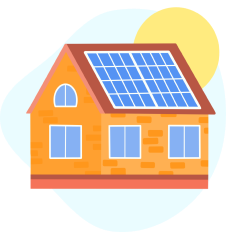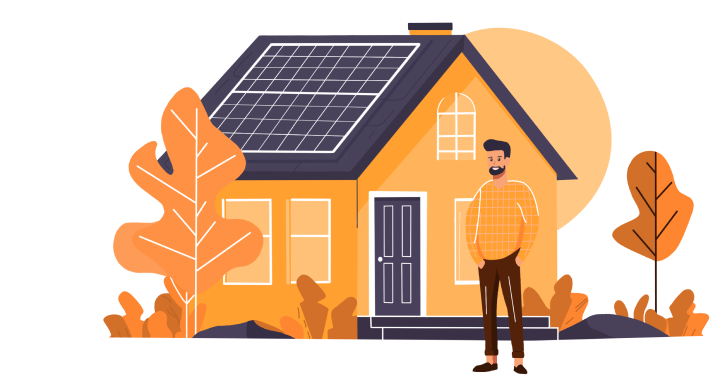Solar power installation might be the solution you're looking for if you're tired of sky-rocketing monthly electricity bills. As energy costs rise, going solar has become a more economical option.
Solar Energy Host is here to help you understand the benefits of solar power installation and help you find the right solar panel services near you. Read on as we discuss the financial and environmental advantages of installing solar panels.
Reason #1: Save money on your energy bills
Solar power installation is becoming a more appealing financial option because it's cheaper now than before, and electricity bills are going up.
The initial solar power installation cost has gone down a lot, making the technology more accessible. Also, modern solar panels last a long time and work efficiently, helping you save on energy costs for many years.
Homeowners experience immediate savings on utility bills with solar panels. These savings are further enhanced by different incentives, like federal tax credits, which reduce the overall expense. Some states also have extra benefits that can greatly reduce your expenses and increase your savings, making solar energy a smart and cost-effective investment.
Reason #2: High return on investment
On average, it takes about 6 to 10 years to earn back the money spent on solar power installation. This time can vary based on the size of the system, local electricity prices, and any available discounts. Using more efficient panels might speed up this process by saving more energy.
After the initial payback period, solar panels will continue to provide financial benefits. After installing solar, they usually last 25 to 30 years, significantly reducing or even eliminating your electricity bills. Adding solar batteries might increase your savings by using energy more efficiently, especially during peak rate times, though it could make the initial payback period longer.
Reason #3: Government incentives and rebates
Homeowners can get a 30 percent federal tax credit for installing solar energy systems, which will be available until 2032. After that, the credit will decrease to 26 percent in 2033 and to 22 percent in 2034 before ending in 2035, unless renewed by the government. States may offer additional benefits like extra tax credits, rebates, and exemptions, which can further reduce costs.
To get these incentives, make sure your solar installation meets the necessary criteria, such as being installed at your main or second home that you own. You'll need to fill out specific forms with your tax return. It's a good idea to consult a tax expert to help apply for these incentives and get the most benefit.
Reason #4: Increase in property values
Homes with solar systems generally sell for as much as 4.1 percent more than those without them. This premium reflects the reduced utility costs and the growing demand for energy-efficient homes.
Real-world examples further underscore the value of solar power installation financing. In certain states, like California, Florida and New Jersey, homes with solar systems not only enjoy a higher resale value but also tend to sell faster than homes without solar panels.
Reason #5: A decrease in the costs of equipment
Since 2010, the cost of installing solar panels in residential, commercial, and utility-scale systems has decreased substantially. For example, residential system prices have dropped by 64 percent, commercial rooftop PV systems by 69 percent, and utility-scale PV systems by 82 percent.
These drops are mainly because of better efficiency in solar panels and lower costs for components like hardware and inverters.
Reason #6: Advancement in technology
Recent developments have led to solar panels achieving up to 23 percent efficiency, with leading brands reaching about 22.8 percent. These improvements come from better silicon cell designs and new manufacturing techniques.
Due to technological advancements and larger production volumes, solar power system installation and solar panel prices have also significantly decreased. New materials like perovskites (crystalline materials for solar cells) are expected to increase efficiencies further while keeping costs low.
Reason #7: Reduces environmental footprint
The deployment of solar energy by different installers significantly reduces carbon emissions. Residential solar systems can offset their lifecycle emissions within two to three years of operation, leading to decades of cleaner energy production. This rapid offset is due to the less carbon-intensive production of solar panels and their increased efficiency.
Solar power installation lowers carbon emissions in both cities and the countryside. In urban areas, where energy use is high, solar panels help cut down on energy from carbon-heavy sources. In rural settings, solar panels can replace diesel generators and other polluting energy sources.
Frequently Asked Questions (FAQ)
How do I choose the right solar panel for my home?
Choosing the right solar panel requires considering important factors such as efficiency, power output, warranty and suitability for your local climate. Major brands provide high-efficiency panels that work well on different roof types and under various weather conditions. It's essential to weigh these features against their cost to ensure you receive the best value for your investment.
What are the steps involved in installing solar panels?
The process starts with assessing your energy needs and choosing the appropriate size and type of system. Next, you need to obtain the necessary permits. Licensed solar power companies then carry out the actual installation. Throughout this process, it's important to work closely with solar power installers, who will make sure the system meets local regulations and fits well with your home's design.
What is net metering and how does it work?
Net metering is a billing method that rewards solar energy system owners for the electricity they contribute to the grid. If your solar panels generate more energy than you use, the surplus is sent back to the grid, and you receive credits that lower your future electric bills. Since net metering policies differ by state, it's important to look into the specific regulations in your area.
Get savings with Solar Energy Host
At Solar Energy Host, we make it easy for homeowners across the USA to adopt solar energy. Our platform clarifies the process, helping you understand, evaluate, and choose the right solar solutions for your home.
Connect with top local providers through our platform by entering basic information. Our transparent and trustworthy service helps you confidently select the right solar option for your needs.
Ready to reduce your electricity bills and help the environment? Take advantage of Solar Energy Host to see potential savings, get a free cost estimate, and receive competitive quotes instantly.




















